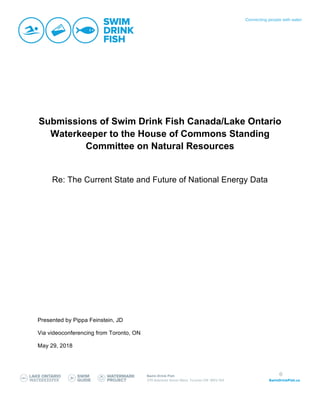Waterkeeper's submission to the NR Standing Committee on the current state and future of National Energy data
- 1. 0 Submissions of Swim Drink Fish Canada/Lake Ontario Waterkeeper to the House of Commons Standing Committee on Natural Resources Re: The Current State and Future of National Energy Data Presented by Pippa Feinstein, JD Via videoconferencing from Toronto, ON May 29, 2018
- 2. 1 Swim Drink Fish Canada/Lake Ontario Waterkeeper (ŌĆ£WaterkeeperŌĆØ) is a grassroots environmental organization that uses research, education, and legal tools to protect and restore the publicŌĆÖs right to swim, drink and fish in Lake Ontario. As a non-political registered charity, Waterkeeper focuses on research and justice issues in the public interest. It works with communities to facilitate the use of environmental laws to protect their rights to swim, drink, and fish, and participates in a variety of legal and public consultation processes to help ensure environmental decisions are made on the basis of sound and tested scientific evidence by independent decision-makers in the public interest. Waterkeeper was invited to present before this Standing Committee, and we thank you all for the opportunity to share our thoughts on the current state and future of energy data in Canada. This is an important time for federal energy policy, and is full of promise for creating a more transparent, accountable, and responsive energy planning and regulatory landscape. Last year, Waterkeeper submitted a written paper to the Expert Panel of the National Energy Board modernization review process. One of the organizationŌĆÖs recommendations addressed the need for an independent body responsible for collecting and disseminating energy data and other information.1 The Expert PanelŌĆÖs final report also ultimately proposed the creation of a ŌĆ£Canadian Energy Information AgencyŌĆØ.2 At the same time, if such an agency is created, and made responsible for producing energy supply and demand forecasts that are then used to inform federal energy policy and assess the economic and technical merits of new energy infrastructure, it must be accompanied by a robust process in which this information can be tested and supplemented by members of the public and public interest organizations with expertise in these areas. As such, the development and provision of this data must be understood and designed with this larger regulatory context in mind.3 Waterkeeper also made several other information and data-specific recommendations in our report to the Expert Panel that may be worth discussing at this time: First and foremost, the development and publication of energy data must be guided by the public interest. Here, conceptions of the public interest must include the right to a healthy 1 See: Swim Drink Fish Canada/Lake Ontario Waterkeeper, ŌĆ£Submissions to the Expert Panel of the National Energy Board modernization review processŌĆØ, March 31, 2017, online: <https://www.waterkeeper.ca/blog/2017/4/11/waterkeepers-submission-on-the-national-energy-boards- modernization-review-process>. 2 See: Report of the Expert Panel on the Modernization of the National Energy Board, ŌĆ£Forward, Together: Enabling CanadaŌĆÖs Clean, Safe, and Secure Energy FutureŌĆØ, Recommendation 1.3.1 at 36, online: < http://www.nrcan.gc.ca/sites/www.nrcan.gc.ca/files/pdf/NEB-Modernization-Report-EN-WebReady.pdf>. 3 This would likely include regional and strategic environmental assessments as well as an Integrated Power System Plan (IPSP)-like process that would determine energy plans and policies. See Supra note 1.
- 3. 2 environment and access to information about how energy production impacts the environment. As such, environmental data (not limited to that concerning climate change) must be included prominently in any future energy data hubs and/or platforms. This should include comprehensive pipeline failure data in line with that currently collected by the US Pipeline and Hazardous Materials Safety Administration (PHMSA).4 It should also include other environmental impacts of energy production and transportation, such as water use and impacts to local watersheds. Second, the accessibility and user-friendliness of energy data is crucial. Waterkeeper advocated for standardized and centralized ŌĆ£one windowŌĆØ access to energy data from across the country ŌĆō from federal, territorial, and provincial governments and government agencies, as well as universities, industry, and the non-profit sector. A single data hub or platform in which all information already being collected can be made compatible for comparison and analysis would be immensely useful. Third, open data and access to disaggregated data (with provisions in place to protect sensitive information) is crucial for government transparency and accountability. It also leads to higher quality science, greater productivity,5 not to mention facilitating more meaningful public engagement. Further, open access disaggregated data does not preclude the continued publication of aggregated data and energy reports which are are already being undertaken by governments and government agencies. Significantly, the federal governmentŌĆÖs most recent Open Data Plan contains several commitments to help guide developments in energy data and information-sharing policies. The Plan commits to expanding and improving open data across the federal public service, with special attention paid to the extractives sector, federal science activities, and geospatial data.6 I will end my presentation there, and look forward to your questions. 4 Supra note 1 at 14-15. Please note, this recommendation is based on a comprehensive report that may be of interest to the Standing Committee: Chiara Belvederesi, Megan Thompson, Petr E Komers, MSES (Management and Solutions in Environmental Science, Inc), ŌĆ£CanadaŌĆÖs federal database is inadequate for the assessment of environmental consequences of oil and gas pipeline failuresŌĆØ, Environmental Reviews, 25(4) May 2017, online: < https://www.researchgate.net/publication/318107441_Canada's_federal_database_is_inadequate_for_the_ass essment_of_environmental_consequences_of_oil_and_gas_pipeline_failures>. 5 See: Stefan Pfessinger et al, ŌĆ£The importance of open data and software: Is energy research lagging behind?ŌĆØ, Energy Policy, Volume 101, February 2017 211-215, online: < https://www.sciencedirect.com/science/article/pii/S0301421516306516>. 6 Government of Canada, ŌĆ£Third Biennial Plan to the Open Government PartnershipŌĆØ, 2016-2018, online:< https://open.canada.ca/en/content/third-biennial-plan-open-government-partnership>.


